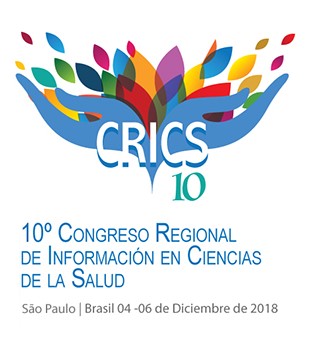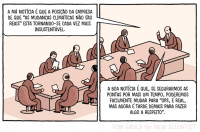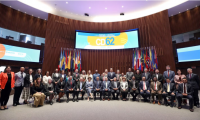CRICS10 will take place in São Paulo (Brazil), on December 4 to 6, 2018

The 10th edition of the Regional Congress on Health Sciences Information (CRICS10) and the 7th edition of the Virtual Health Library Coordination Meeting (VHL7) will be held in São Paulo from 4 to 6 December 2018. It is expected the presence of approximately 500 participants from institutions that network with BIREME/PAHO/WHO in the development of projects, products and services that contribute to the access to scientific and technical health information in Latin American and Caribbean countries (AL & C), in addition to other regions.
The theme of the congress is "Toward the reach of Agenda 2030: contributions of evidence and knowledge" and has as main thematic axes: (1) Innovation and Digital Health; (2) Information management; (3) Knowledge management; (4) Evidence-informed policies, strategies and decisions; (5) Intersectoriality; (6) Research and scientific communication; and (7) Open Science.
About CRICS
The Regional Congress on Health Sciences Information (CRICS) is one of the most important international congresses in information and scientific communication in health, whose objective is to present and debate the regional and international state of the art in this area. In its tenth edition, CRICS10 will have as main topic “Advancing towards the 2030 Agenda: contributions of evidence and knowledge”.
CRICS10 is organized by the Pan American Health Organization / World Health Organization (PAHO/WHO), through its Specialized Center, the Latin American and Caribbean Center on Health Sciences Information (BIREME) with the support of national institutions of Latin America and Caribbean countries. The effective participation of authorities, public managers, professionals and students from health sciences, health education, librarianship and other related areas working towards the democratization of access to scientific information in the Region is expected.
Regarding the topics of CRICS10, the principles of the 2030 Agenda stand out, which made clearer the links between health, education, the environment and other aspects. While the Sustainable Development Goals (SDG) contain a single explicitly targeted goal for health – ODS 3, which is to “ensure a healthy life and promote well-being for all at all ages” – each of the other objectives address issues that have important health impacts. They cover issues ranging from continuing efforts to meet the Millennium Development Goals (MDG) to meet significant challenges to achieving universal coverage, as well as addressing emerging diseases, noncommunicable diseases, environmental pollution, climate change, illicit drugs, migration and traffic safety. As a result, the SDG represent an effective platform in which health policies can be built to benefit future generations.
The Region of the Americas has taken a step forward by agreeing on a 2018-2030 Sustainable Health Agenda for the Region (ASSA2030). This agenda is a collective call to action to achieve higher levels of health and well-being in the new regional and global context. The agenda was adopted in September 2017 at the 29th Session of the Pan American Sanitary Conference, the highest PAHO/WHO authority forum, with representation from all countries in the Region. ASSA2030 represents the health sector’s response to country commitments in the 2030 Sustainable Development Agenda, the unfinished MDG issues and the 2008-2017 Health Agenda for the Americas, as well as new and future challenges in Public Health.
Information, evidence and knowledge are transversal in the Region’s 2030 Agenda of the Americas, which is why CRICS10, with the themes of innovation and digital health, information management, knowledge management, evidence-informed policies and decisions, intersectoriality , open science, and scientific research and communication, will be a forum conducive to the exchange of experiences related to the contributions that the evidence and the knowledge offer towards the fulfillment of the 2030 Agenda.



